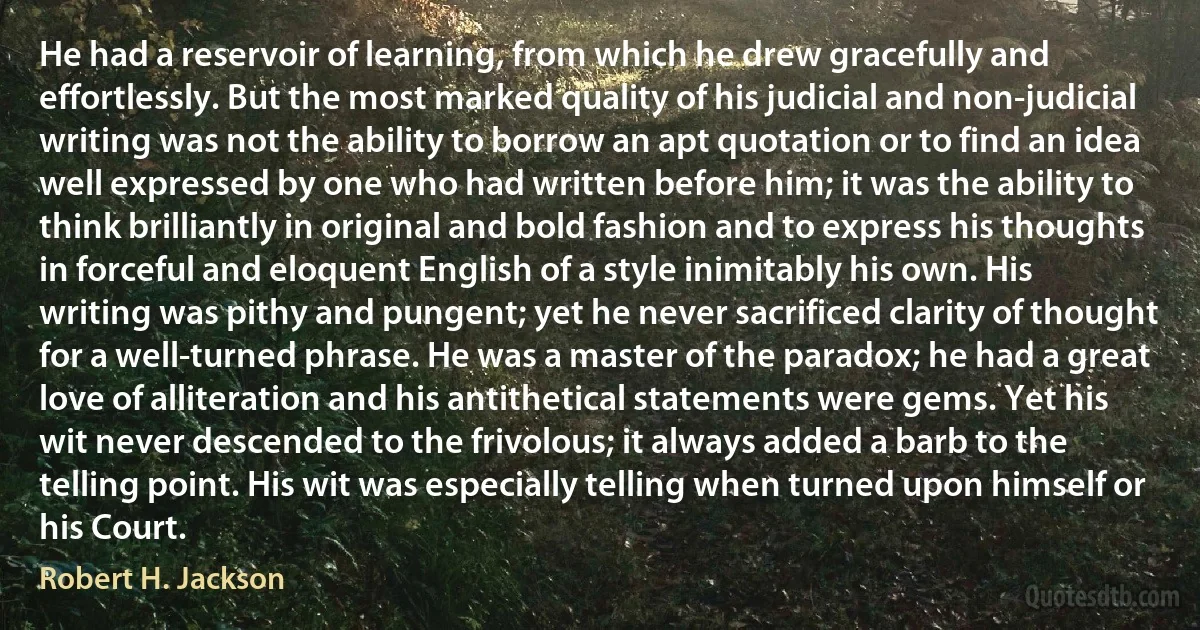
He had a reservoir of learning, from which he drew gracefully and effortlessly. But the most marked quality of his judicial and non-judicial writing was not the ability to borrow an apt quotation or to find an idea well expressed by one who had written before him; it was the ability to think brilliantly in original and bold fashion and to express his thoughts in forceful and eloquent English of a style inimitably his own. His writing was pithy and pungent; yet he never sacrificed clarity of thought for a well-turned phrase. He was a master of the paradox; he had a great love of alliteration and his antithetical statements were gems. Yet his wit never descended to the frivolous; it always added a barb to the telling point. His wit was especially telling when turned upon himself or his Court.
Robert H. JacksonRelated topics
ability alliteration bold borrow clarity court drew english fashion find great idea judicial learning love master paradox point quality reservoir telling thought think well wit write yetRelated quotes
But today the fashion is to ascribe the extinction of Buddhism to the persecution of Buddhists by Hindus, to the destruction of their temples by the Hindus. One point is that the Marxist historians who have been perpetrating this falsehood have not been able to produce even an iota of evidence to substantiate the concoction. In one typical instance, Romila Thapar had cited three inscriptions. The indefatigable Sita Ram Goel looked them up. Two of these turned out to have absolutely no connection with Buddhist viharas or their destruction, and the one that did deal with an object being destroyed had been held by authorities to have been a concoction; in any event, it told a story which was as different from what the historian had insinuated as day from night.

Arun Shourie
There was one artist who wrote as beautifully as he painted. That was Hokusai - He speaks for all artists, whether they are painters or not. [He wrote]: "I have been in love with painting ever since I became conscious of it at the age of six. I drew some pictures I thought fairly good when I was fifty, but really nothing I did before the age of seventy was of any value at all. At seventy three I have at last caught every aspect of nature-birds, fish, animals, insects, trees, grasses, all. When I am eighty I shall have developed still further. And I will really master the secrets of art at ninety. When I reach a hundred my work will be truly sublime, and my final goal will be attained around the age of one hundred and ten, when every line and dot I draw will be imbued with life."

Henry Miller
For what advantage is it, that the world enjoys profound peace, if thou art at war with thyself? This then is the peace we should keep. If we have it, nothing from without will be able to harm us. And to this end the public peace contributes no little: whence it is said, ‘That we may lead a quiet and peaceable life.' But if any one is disturbed when there is quiet, he is a miserable creature. Seest thou that He speaks of this peace which I call the third (inner, ed.) kind? Therefore when he has said, ‘that we may lead a quiet and peaceable life,' he does not stop there, but adds ‘in all godliness and honesty.' But we cannot live in godliness and honesty, unless that peace be established. For when curious reasonings disturb our faith, what peace is there? or when spirits of uncleanness, what peace is there?

John Chrysostom
Don't forget that God sees you and watches you when you are in pain; He perceives even the beating of your heart. Consequently, He will not leave you without consolation and His fatherly protection. Naturally, the saints rejoiced in their afflictions; as for us, let us at least manage to accept affliction or pain patiently.
My child, pray within your heart, and the name of Jesus will become for you a comforting balm so that you can bear this trial of yours in a way which benefits you. You will greatly benefit from this trial if you submit yourself to it patiently. So again I say to you, with the almighty armor of prayer continually approach the omnipotent Lord more often, and you will come to know how He wondrously lifts the burden of pain and marvellously gives rest to sufferers.

Ephraim of Arizona
WHAT HAPPENS AFTER DEATH?
When a human soul goes out of the body, some great mystery happens. For if it is guilty of sins, then there come hordes of demons, evil angels and dark forces, take that soul and drag it to their side.
No one should be surprised at that, because if a man surrendered and fell prey to them while still alive in this world, will not they have even greater control over him and enslave him when he departs from this world?
As for the other, the better part of people, something different happens to them. There are Angels around the holy servants of God in this life; the holy spirits surround them and protect them; and when their souls are separated from the body, the choir of Angels welcomes them into their fellowship, into a bright life, and thus leads them to the Lord.

Macarius of Egypt
